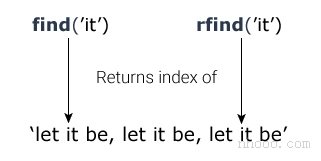Python 基础教程
- Python 简介
- Python 入门
- Python 关键字和标识符
- Python 语句,缩进和注释
- Python 变量,常量和字面量
- Python 数据类型
- Python 类型转换
- Python 输入,输出和导入
- Python 运算符
- Python 关键字列表
Python 流程控制
Python 函数
- Python 函数
- Python 函数参数
- Python 递归(Recursion)
- Python 匿名函数(Lambda)
- Python 全局,局部和非局部变量
- Python Global 关键字
- Python 模块
- Python 包(Package)
- Python 自定义函数
Python 数据类型
- Python 数字(Number)
- Python 列表(List)
- Python 元组(Tuple)
- Python 字符串(String)
- Python 集合(Set)
- Python 字典(Dictionary)
- Python 集合方法
Python 文件操作
Python 对象和类
Python 日期和时间
- Python 日期时间(datetime)
- Python strftime()
- Python strptime()
- Python 当前日期和时间
- Python 获取当前时间
- Python 时间戳( timestamp)
- Python time 模块
- Python sleep()
Python 高级知识
- Python 命名空间和作用域
- Python 迭代器
- Python 生成器
- Python 闭包
- Python 装饰器
- Python @property
- Python 正则表达式(RegEx)
- Python 随机模块(Random)
- Python 数学模块(Math)
- Python 数组
- Python main() 函数
- Python 字典理解
- Python 多态
- Python pip
- Python 矩阵和NumPy数组
Python 参考手册
Python 字符串 find() 使用方法及示例
find()方法返回子字符串首次出现的索引值(如果找到)。如果找不到,则返回-1。
find()方法的语法为:
str.find(sub[, start[, end]] )
find()参数
find()方法最多使用三个参数:
sub- 它是在str字符串中要搜索的子字符串。
start和end (可选)-在其中搜索子字符串str[start:end]
find()返回值
find()方法返回一个整数值。
如果字符串中存在子字符串,则返回该子字符串首次出现的索引。
如果字符串中不存在子字符串,则返回-1。

示例1:无开始和结束参数的find()
quote = 'Let it be, let it be, let it be'
result = quote.find('let it')
print("子字符串 'let it':", result)
result = quote.find('small')
print("子字符串 'small ':", result)
# 如何使用find()
if (quote.find('be,') != -1):
print("包含字符串 'be,'")
else:
print("未包含字符串")运行该程序时,输出为:
子字符串 'let it': 11 子字符串 'small ': -1 包含字符串 'be,'
示例2:带有开始和结束参数的find()
quote = 'Do small things with great love'
# 搜索子字符串 'hings with great love'
print(quote.find('small things', 10))
# 搜索子字符串 ' small things with great love'
print(quote.find('small things', 2))
# 搜索子字符串 'hings with great lov'
print(quote.find('o small ', 10, -1))
# 搜索子字符串 'll things with'
print(quote.find('things ', 6, 20))运行该程序时,输出为:
-1 3 -1 9